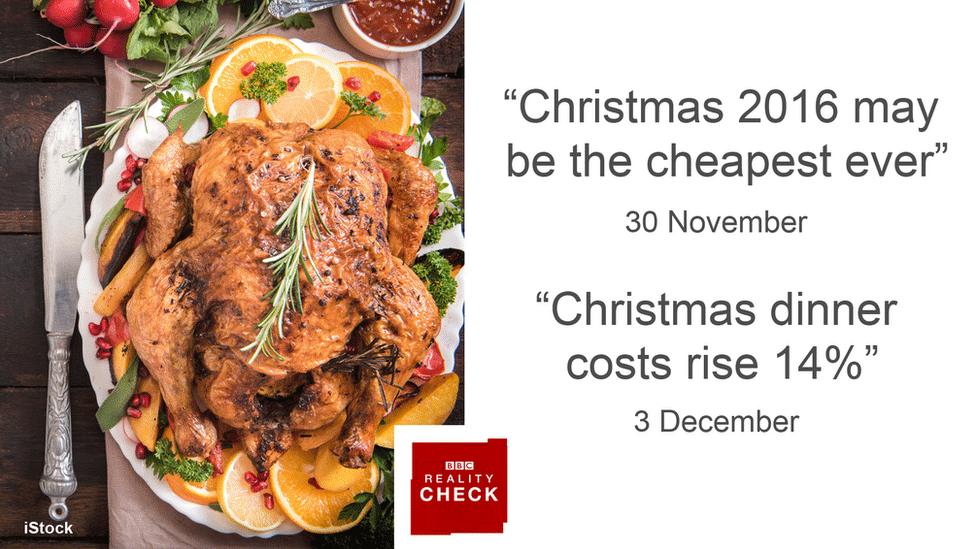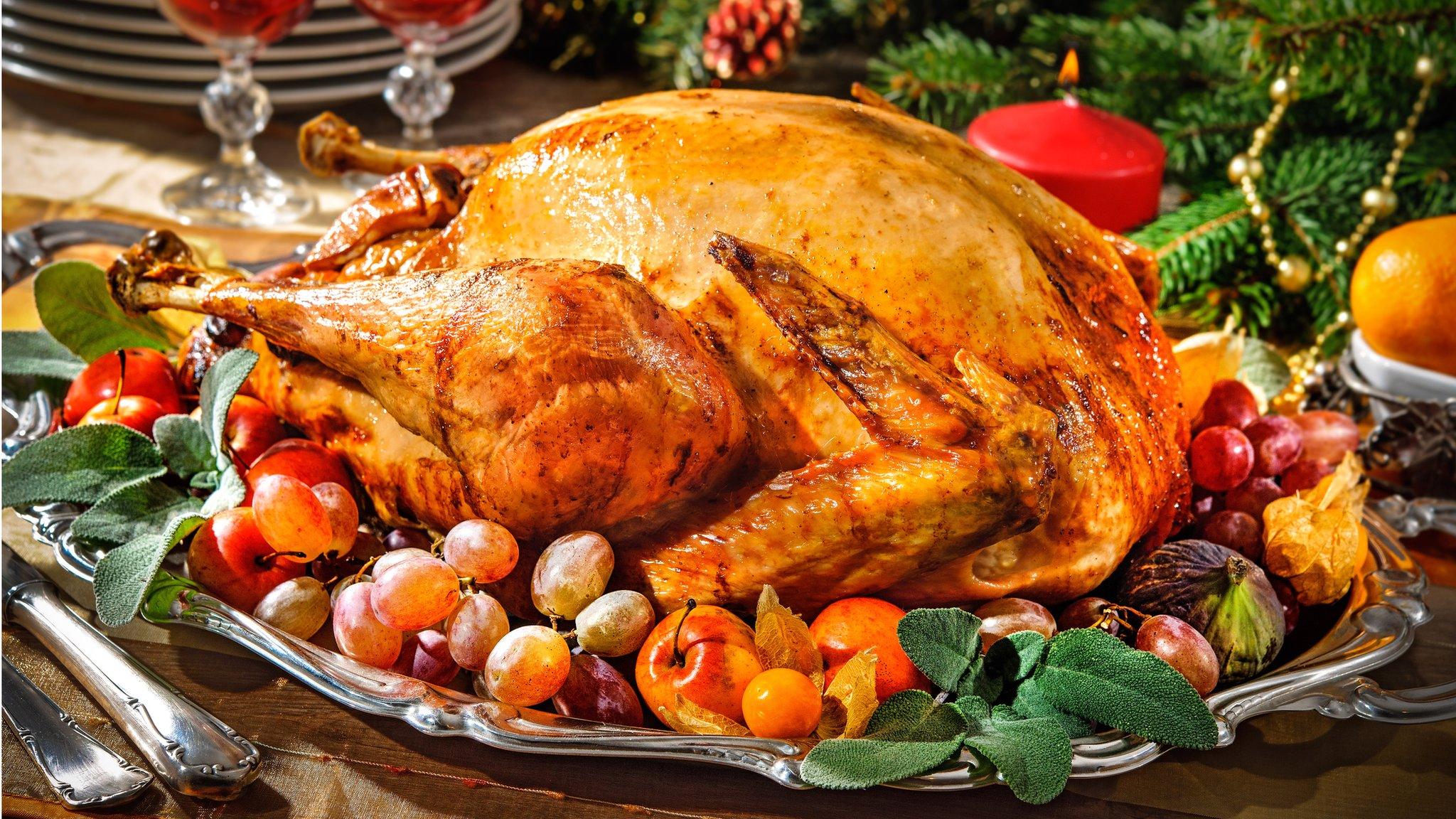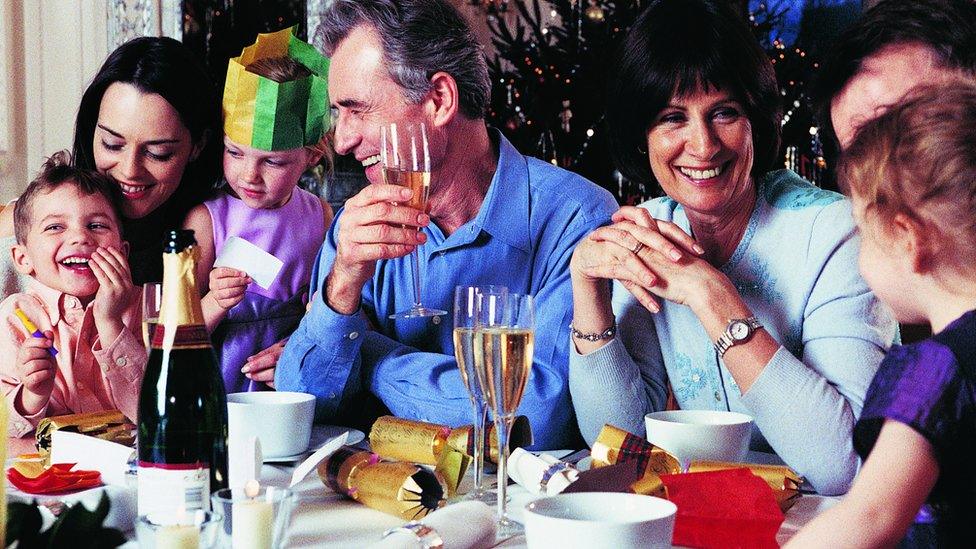Reality Check: Is Christmas dinner going up or down?
- Published

The claim: The cost of Christmas dinner this year will either be the cheapest ever or 14% up on last year.
Reality Check verdict: The two pieces of research look into the cost of buying different things at different shops so it is no great surprise that they get different answers.
The BBC News website has run stories in the past week, one of which asserted that Christmas 2016 may be the cheapest ever, while the other said that Christmas dinner costs had risen 14%.
The Reality Check team was asked to investigate which is true.
The first headline came from research by Good Housekeeping, external, and the first thing to stress is that when it says it will be the cheapest Christmas dinner to date, that means since it started doing the calculation in 2009.
The headline figure was that you could feed Christmas dinner to eight people for £19.84, or £2.48 a head, but that involves buying your 11 essential ingredients from four different shops.
It's that figure that is the lowest since the research started.
The 11 items are:
turkey
potatoes
stuffing mix
Brussels sprouts
carrots
parsnips
cranberry sauce
Christmas pudding
brandy butter
mince pies
Christmas cake
If you buy them all from just one shop, then the cheapest you can manage is £22.03 at Aldi, followed by £24.57 at Lidl.
The cheapest of the big supermarkets was Tesco at £28.08, with the highest price for the basket being £49.40 at Marks and Spencer.
Of the comparable supermarkets that they also looked at in 2010, Asda, Morrisons and M&S are more expensive now, Co-op has barely changed and Tesco, Lidl and Sainsbury's are cheaper.
There is a huge range of prices, and you would have to go to a great deal of trouble to get the sub-£20 dinner.
Different basket
The second headline comes from BBC research using figures from mySupermarket.
It's based on making Christmas dinner for six instead of eight, and the basket of goods is different.
There's no brandy butter, mince pies or Christmas cake, but you do get gravy, red and white wine and a box of crackers.
This research is into what a typical shopper will pay, so it concentrates on the big supermarkets where most people shop, such as Tesco, Sainsbury's, Asda and Morrisons, rather than the discounters Aldi and Lidl.
It also uses averages across types of products, rather than necessarily looking for the cheapest.
It means that the typical cost of Christmas dinner comes in at £10.71 per person, up from £9.41 last year.
That's a huge difference from the £2.48 a head in the Good Housekeeping version, which wouldn't even pay for the £25 turkey in the BBC research.
Just the wine and crackers add £3.68 a head, and they are among the products that have gone up in price the most.
These are by no means the only pieces of research we've had about the cost of Christmas.
The cost of Christmas past widget, external claims to offer comparable figures for Christmas expenses going back to 1968, including purchases such as a 6ft Christmas tree and best-selling toys.
But the items in the Christmas dinner, not all of which are traditional festive ingredients, are:
sliced cooked ham
streaky bacon
pork sausages
roasting chicken
potatoes
green cabbage
cauliflower
carrots
Brussels sprouts
peas
broccoli
oranges
a pint of draught lager
The selection may have more to do with which items are in the Office for National Statistics' inflation basket of goods going back to 1968.
Taking a broader look at prices, the British Retail Consortium says, external food prices were 0.8% lower in November than they had been a year earlier, claiming that overall the cost of the Christmas shop is lower now than it was three years ago.
So food in general is slightly cheaper - what you end up paying for Christmas dinner will depend on how you shop and how much time you have to do it.



- Published3 December 2016

- Published30 November 2016
